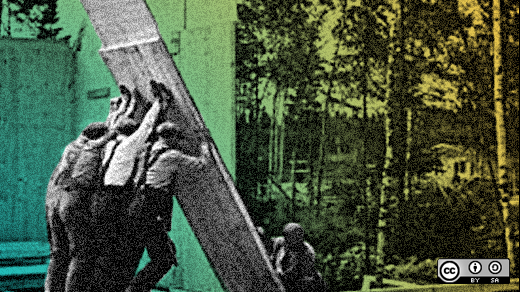Open source has achieved a bit of popularity in the tech world, and has even become a bit mainstream. I sadly think this means that many have and will continue to miss the point of what being open source really means. Open source doesn't just mean showing source code. Many people think that such code drops are the only thing necessary for open source buzz to take over. There are sadly so many examples of tacking on the words "open source" to a product's signage that the landscape is littered with them. In addition to exposing your code (or methods in the case of non-software projects) there are really at least two other principles that need to be present for real open source legitimacy.
Inclusion
If you are going to legitametely adopt the open source mantra, you must expect, prepare for, and welcome outsiders into your organization (dare I say--community?). As a matter of fact you should probably spend significant time working on making sure outsiders can really participate. Largely this is going to consist of changing culture, and removing roadmaps as well as identifying and exposing the processes for getting involved. For instance, how does one get commit access? How does one start a sub-project to address a certain niche. While in the beginning most of this participation will be peripheral and likely lightweight you should be ready over time for outsiders to become core contributors to your project. You should also make sure that part of your inclusion is showing who you want to include by making sure that your overall objectives and mission are well stated and understood. You need to clearly establish where you intend to go so you don't end up with an angry community who wants to hold you to the original vision--or at least their perception of the original vision.
Transparency
The final piece is transparency. Transparency means decisions are made publicly, and hopefully deliberations are as well. If your active community is surprised or caught unaware you've done it wrong. This is a difficult cultural issue for people to adjust to, particularly if the 'news' is bad. Transparency means people should always know where you are headed, be that roadmaps, published goals, ongoing deliberations, etc. Even if all of your work is being done by insiders, a newcomer should still be able to come to your site find out the groups directions and decide if they want to help and find a place to start working towards that goal in 15-20 minutes.
Finally you need to get out of the way, and if you've done it right up to this point you need to actively ensure that you and other insiders are constantly ensuring that you aren't blocking people who want to participate and get things done. Excessive amounts of time granting permission and giving resources that can only be touched by insiders are good warning signs that you are being a hindrance rather than a catalyst. Most people are reluctant to let go, sometimes even scared to do so. It should be obvious though, that this power you are so scared of is one of the reasons and benefits of going open source; why would you miss out on that?





4 Comments